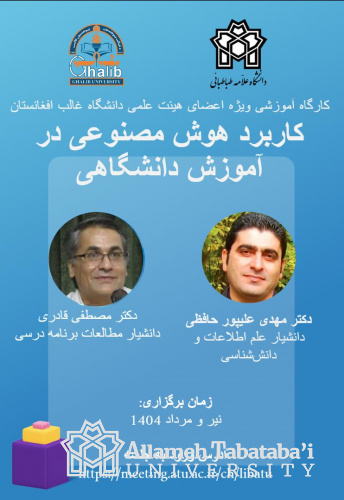ATU holds workshop for for Professors of Ghalib University of Herat:
Application of AI Tools in University Education

Report by Directorate for International Academic Cooperation, Allameh Tabataba'i University, Tehran—
Translated into English by Rasoul Firouzi
In July and August 2025, Allameh Tabataba'i University (ATU) organized an online training workshop titled "Application of Artificial Intelligence Tools in University Education" for faculty members at Ghalib University of Herat, Afghanistan. The five-day online event provided an opportunity for Afghan professors to gain expertise in the latest advancements in educational technologies within AI.
The focus of the course was to introduce the operational methods and capabilities of AI in the teaching and learning process. The instructors, Dr Mehdi Alipour Hafezi, faculty member from the Department of Knowledge and Information Science, and Dr Mostafa Ghaderi, faculty member from the Department of Curriculum Studies, ATU, began with an overview of the TPACK model. This framework, which integrates the three dimensions of technological knowledge, content knowledge, and pedagogical knowledge, offered a starting point for professors to understand the application of each tool within the context of their own course objectives. Simultaneously, by addressing Bloom's cognitive dimensions, which outline the stages of learning from basic information to creation and evaluation, participants gained a deeper understanding of how to set course goals and design diverse activities.
The discussion then shifted to identifying the real-world needs of professors in university classrooms. Topics ranged from designing lesson plans and planning session content to allocating time and budgeting for educational resources; from creating student content and making slides more engaging to setting exams and designing long-term and short-term questions for continuous assessment of student performance. Through interactive workshop sessions, the Afghan professors presented their challenges, and the instructors offered a variety of solutions using AI tools—solutions that included everything from automated question bank generation to analyzing student learning patterns.
A unique feature of this course was the practical demonstration of both general and specialized AI-based tools. Throughout the workshop, AI models like Grok were introduced as tools for analyzing course content and extracting key points. Unstuck, with its different approach to solving learning problems and maintaining student motivation, and LlamaTutor, with its ability to design interactive educational scenarios, were among the practical examples tested. Alongside these, the Google AI Studio platform allowed participants to become familiar with the development environment for machine learning models and to discuss how these models could be applied to analyze educational data. Furthermore, Gamma and Hix were presented as tools for content creation and visual slide design, offering features like layout suggestions, smart color schemes, and automatic point extraction. The central theme for introducing these visualization tools was the transformation of classrooms into engaging, multimedia-rich spaces.
The material was presented in a three-layered approach: first, an explanation of theoretical concepts and broad educational frameworks; second, a live demonstration of the tools in use; and finally, the assignment of practical exercises to the participants. Each day, after the theoretical discussions concluded, the Afghan professors engaged in trial and error with the tools, enriching their experience through feedback from their peers and the instructors. This blended approach not only facilitated a smoother learning curve but also strengthened the academic network between the professors of the two countries.
In addition to the technical aspects, a dedicated panel was held in the final session to discuss the ethics of using artificial intelligence in education. The first topic was algorithmic transparency; professors emphasized that clear information about how the tools work is crucial for building student trust and preventing misunderstandings. The issue of privacy, legal considerations in processing personal and academic student data, and the necessity of guaranteeing information security were discussed. In light of national and international laws, mechanisms were proposed to enable universities to leverage AI while protecting individual and collective rights.
The next discussion revolved around the challenge of bias. Experts warned that inequitable training data can produce unjust results, leading to machine learning reinforcing existing inequalities. Therefore, it was stressed that professors must examine the nature of the training data and potential biases within it before using any model or tool, and, if necessary, redefine the data or recalibrate the algorithms.
The concept of educational accountability was also reviewed. Contrary to the belief held by some that AI will replace instructors, the experts at the workshop emphasized the need for careful faculty oversight of AI outputs. They asserted that the ultimate role of the professor in validating content, guiding the learning path, and clarifying ambiguities is undeniable, and that artificial intelligence should serve this role, never replacing the human element.
One of the final concerns raised by participants was preventing students from using AI tools for systematic cheating. The Afghan and Iranian instructors suggested that by designing creative questions, open-ended exercises, and group projects that require process-oriented evaluation, reliance on purely AI-generated outputs could be discouraged, while still accepting its use as an effective aid in the learning process.
On the sidelines of the workshop, an atmosphere of cultural exchange and dialogue between the Iranian and Afghan participants added another dimension to the course. The professors from Afghanistan described the educational situation in their universities and the challenges of accessing up-to-date resources, while the instructors from Allameh Tabataba'i University outlined a clear vision for future academic collaborations, including joint in-person courses and the launch of a shared virtual education platform.
At the end of the fifth day, with expressions of satisfaction from the participants and positive survey feedback, a new chapter of scientific cooperation was opened between Allameh Tabataba'i University and the universities of Afghanistan. More than anything, this workshop proved that in an era of social transformations and population shifts, science and education can build a strong bridge, allowing the academics and students of two nations to move forward in a lasting bond, independent of political issues.
Educational officials are now reviewing the workshop's outcomes and defining joint research projects to not only transfer technology but also to create a foundation for collaborative content production and research focused on the local needs of Afghanistan. It is hoped that these achievements will contribute to the development of educational infrastructure and enhance the quality of universities in Afghanistan, playing a key role in shaping a shared and sustainable future for the two neighboring countries.


